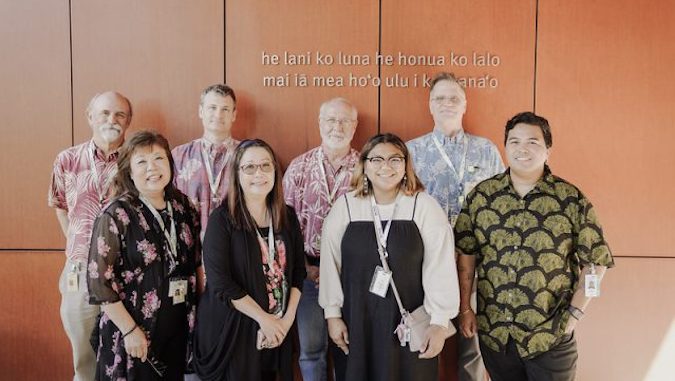
A University of Hawaiʻi at Mānoa John A. Burns School of Medicine (JABSOM) program that builds the foundation for the next generation of biomedical researchers has been funded $21.3 million for another five years by the National Institute of General Medical Sciences.
The Institutional Development Award (IDeA) Networks of Biomedical Research Excellence (INBRE) received funding from the National Institutes of Health to continue the work of expanding research opportunities in Hawaiʻi. HI-INBRE is administratively based at JABSOM with a mission to fortify research programs statewide in order to put more undergraduates on the road to a biomedical science career.
The renewal of the INBRE grant allows the JABSOM program to continue to increase the pipeline of students in STEM and strengthen the biomedical research expertise at undergraduate institutions and community colleges in Hawaiʻi. This is a pathway for these students to pursue biomedical research and workforce careers. The grant will also facilitate infrastructure development, support postdoctoral fellows and expand the state-of-the-art Data Science Core.
This includes strategic approaches to providing resource and mentorship opportunities to junior and pilot investigators as a means to incorporate research into curriculum. INBRE increases biomedical research capacity across the state by providing these resources and expertise to community colleges and primarily undergraduate institutes across the state.
Cell and Molecular Biology Professor Robert Nichols led the last previous two cycles.Peter Hoffmann, a professor who is also with the department, will take over as principal investigator with Ben Fogelgren, associate professor of anatomy, biochemistry and physiology, taking on the role of program coordinator.
“We are thrilled to have this competitive renewal fully funded so that we can continue to build upon our past successes and expand the Hawaiʻi network of biomedical researchers, scholars and students,” said Hoffmann. “Our leadership works closely with the participating faculty with the goal of strengthening our research capacity throughout Hawaiʻi. We have many exciting programs and lofty goals set for the INBRE V cycle—time to get to work!”
Engaging with UH community colleges, other institutions
INBRE has worked closely with faculty and students from UH Maui College, Kapiʻolani Community College, Leeward CC, Windward CC, UH Hilo, UH West Oʻahu, Chaminade University and Hawaiʻi Pacific University. Engaging students interested in biomedical research at the community college level and other higher education institutions is the first step in building a strong community of health science research in Hawaiʻi. INBRE provides aspiring biomedical researchers opportunities to investigate complex issues such as obesity and vaccine development, which impact the population of Hawaiʻi and beyond.
I found people who were willing to spend time nurturing the education and skill set of future scientists.
—Lance Nunes
In the past five years alone, HI-INBRE has engaged more than 600 students from more than 20 different ethnic groups in research opportunities with the goal of building a &lduqo;pipeline” for biomedical research careers in our state. In so doing, HI-INBRE enhances biomedical science and technological knowledge amongst our state’s workforce.
Lance Nunes is one of them. He was part of the INBRE program during his time at the UH Mānoa and is now at the JABSOM pursuing a doctorate in developmental and reproductive biology, winning awards along the way such as the Kai Bowden ARCS Award in Medicine as well as the 2023 Biomedical Symposium Best Presentation award.
“INBRE is one of the main reasons I became a scientist,” Nunes said. “Going through undergraduate school, you try different things. You never know what you want to do until you try it, and INBRE introduced me to different research labs. I found people who were willing to spend time nurturing the education and skill set of future scientists.”

